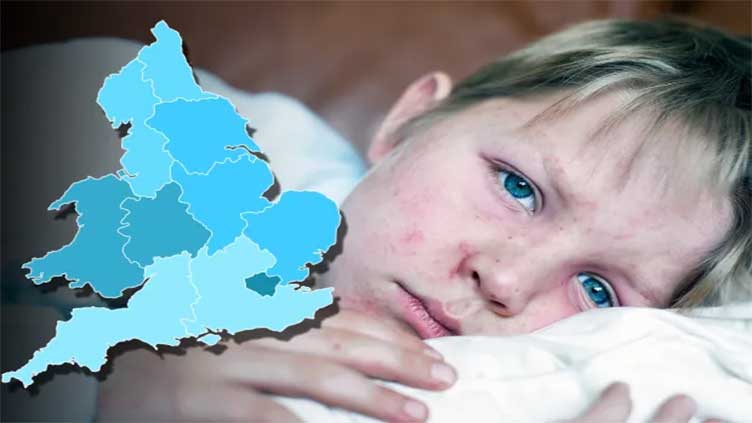Measles kills 136,000 kids every year – would you recognise symptoms in your child before it's too late?

Measles deaths across the world increased by 43 per cent in 2022
(Web Desk) - Measles is a highly infectious illness that can cause serious complications, including pneumonia, meningitis and blindness.
Getting the MMR vaccine can prevent little ones from getting the bug - but a new report has found that measles cases jumped dramatically last year due to a decline in jab rates, killing 136,200 globally.
Measles deaths across the world increased by 43 per cent in 2022, up from 95,000 the previous year, the Centers for Disease Control and Prevention (CDC) revealed.
It added that cases had jumped by 18 per cent in that same time period - from about 7.8million to 9.2million- while the number of countries reporting "large or disruptive outbreaks" of measles rose from 22 to 37.
John Vertefeuille, director of the CDC's Global Immunisation Division, said in a statement: "The increase in measles outbreaks and deaths is staggering, but unfortunately, not unexpected given the declining vaccination rates we've seen in the past few years."
It comes as Sheffield was put on measles alert, with several kids being rushed to the city's Children’s Hospital with the highly infectious bug.
Most parents will know to recognise measles from the dotty rash that pops up on their child's head or neck before spreading to the rest of the body.
But this telltale rash usually appears a few days after your little one falls ill - and there are nine other symptoms parents should keep their eyes peeled for, according to NHS Inform.
Measles symptoms typically start appearing about 10 days after infection. They can include: Cold-like symptoms, such as a runny nose, sneezing, and a cough, Sore, red eyes that may be sensitive to light, Watery eyes, Swollen eyes, A high temperature that may reach around 40C, Small greyish-white spots in cheeks or back of the lips, Aches and pains, Loss of appetite, Tiredness, irritability and a general lack of energy
The measles rash typically develops around two to four days after the cold-like symptoms.
The telltale rash: Usually first appears on the head or neck - typically on the face and behind the ears - before spreading outwards to the rest of the body
Is made up of small red-brown, flat or slightly raised spots that may join together into larger blotchy patches
Looks brown or red on white skin but can be harder to see on black or brown skin
Is not usually itchy but can be slightly itchy for some people
If you think you or your little one has measles, you should phone your GP urgently.
It's also important to do so if your child has been in close contact with someone who has measles and has not been fully vaccinated or hasn't had the infection before.
Do this even if they don’t have any symptoms.
How can I look after a child with measles?
Measles can be very unpleasant for your little one to go through, but it can be treated at home and will usually pass within a week to 10 days.
The NHS says it can help your child to: Rest and drink plenty of fluids, Take paracetamol or ibuprofen to relieve a high temperature – but do not give aspirin to children under 16 years, Have crusts from their eyes gently removed with cotton wool soaked in warm water, Your youngster should stay off nursery or school for at least four days after the rash appears.
Measles can be easily prevented by getting your little one vaccinated with two doses of the measles, mumps and rubella (MMR) vaccine.
It's typically given to babies and young tots through the NHS vaccination schedule.
The first dose can be given when your child is one and the second when they're three years and four months.
If your child has missed these jabs, you can still ask your GP surgery to give them.
When should I get my child urgent help?: Measles can turn serious for some people if it spreads to other parts of the body, such as the lungs or brain.
In these cases, it can result in problems such as pneumonia, meningitis, blindness and seizures, according to the NHS.
You should call 999 or go to A&E if your child has measles and: Shortness of breath, A high temperature that does not come down after taking paracetamol or ibuprofen


